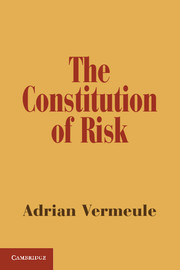Introduction
Published online by Cambridge University Press: 05 June 2014
Summary
I have two claims to offer. One is that constitutional rulemaking is best understood as a means to regulate and manage political risks. The other is that an approach I will call “optimizing constitutionalism” is the best approach to constitutional risk regulation. It will take a book to flesh out these claims, but let me at least introduce them.
CONSTITUTIONS AS RISK-MANAGEMENT DEVICES
What do constitutions do? Legal and political theory offer several answers. Constitutions create and empower government by coordinating expectations and thereby creating institutions of lawmaking; constitutions tie the hands of majorities in ways that protect majorities from their own predictable excesses and pathologies; constitutions protect the rights of discrete and insular minorities; constitutions further moral principles of equality, freedom, and human dignity; and, most generally, constitutions “design democracy.”
None of these answers is wrong, exactly. The problem is to determine whether and how they i t together. Each of the answers identifies a value or good promoted by constitutionalism, but those goods may work at cross-purposes to one another and, under certain conditions, trade off against one another. Empowering popular control through a coordinated set of lawmaking institutions creates a risk of majoritarian oppression; in turn, creating a set of insulated institutions, such as courts, to protect the rights of minorities risks undermining democracy and political equality; and so on. In these cases, the tensions between and among the values of constitutionalism are best understood not as contradictions, but as competing risks and tradeoffs. Our problem is not that we have no good theories of constitutionalism, but that we have too many, with too little understanding of how the plural aims and values of constitutionalism relate to one another under the conditions of uncertainty that bedevil constitutional rulemaking.
Information
- Type
- Chapter
- Information
- The Constitution of Risk , pp. 1 - 24Publisher: Cambridge University PressPrint publication year: 2013
